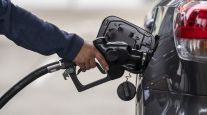Deficit Panel Leaders Propose Increase of Federal Fuel Tax by 15 Cents
This story appears in the Nov. 15 print edition of Transport Topics.
The co-chairmen of a bipartisan presidential commission created to find ways to reduce the federal deficit last week called for gradually raising the federal fuel tax by 15 cents a gallon, beginning in 2013.
The Nov. 10 recommendation by the leaders of the National Commission on Fiscal Responsibility and Reform, appointed by President Obama in February, was the third time in recent years that a national commission has recommended raising fuel taxes, which have been unchanged since 1993.
The debt commission is led by former Republican Sen. Alan Simpson (Wyo.) and Erskine Bowles, chief of staff to former Democratic President Bill Clinton.
Simpson and Bowles also proposed cuts to Social Security and Medicare and reducing income taxes, among other things, to slash the budget gap. The 18-member debt commission, composed of 12 members of Congress and six private citizens, plans to issue its final report on ways to reduce the federal budget deficit by Dec. 1, but the recommendations must be approved by 14 members before a report can be sent to Congress.
The draft proposal drew immediate bipartisan criticism. In a statement, House Speaker Nancy Pelosi (D-Calif.) called it “simply unacceptable,” while three Republicans including commission member Rep. Dave Camp (R-Mich.), stated, “This is a provocative proposal, and while we have concerns with some of their specifics, we commend the co-chairs for advancing the debate.”
The commissioners’ proposal came less than a week after two senators — one Democrat and one Republican — wrote a letter advocating a 25-cent fuel tax increase, of which 15 cents would go to transportation projects.
Sens. Tom Carper (D-Del.), and George Voinovich (R-Ohio), made their recommendations in a letter to commission members.
Trust fund revenues have not kept pace with infrastructure spending, forcing Congress to transfer money from the general fund to keep the Highway Trust Fund solvent (click here for previous story).
The debt commission’s draft proposal would dedicate all the increased fuel tax revenues to the highway fund, while the Voinovich-Carper proposal would have devoted 15 cents of the increase to infrastructure and 10 cents to retire federal debt.
Voinovich and Carper said it’s critical that Congress act immediately to repair the nation’s crumbling transportation infrastructure.
“The federal transportation program is suffering from two crises,” said Voinovich and Carper. “First, the Highway Trust Fund’s revenue stream is insufficient for current outlays. Second, the existing level of transportation investment is inadequate to maintain our infrastructure and provide for 21st century improvements.”
The last federal gasoline tax increase was in 1993, when Congress raised it by 4.3 cents to 18.4 cents a gallon. The federal diesel fuel tax currently is 24.4 cents a gallon.
Although outgoing House Transportation Committee Chairman Rep. James Oberstar (D-Minn.), who was defeated Nov. 2, has backed a fuel-tax increase for transportation, raising the levies would likely face stiff opposition when the new Congress convenes in January.
“I know the Obama administration has said it is opposed to a tax increase and that Congressman Mica and others say they’re opposed,” Jim Berard, a Democratic spokesman for the House Transportation Committee, told Transport Topics. “But we have to go through the process and determine how best to achieve whatever revenue gains that we can. That could be an increase in the gas tax or it could be another source of revenue.”
A spokesman for Rep. John Mica (R-Fla.), who is slated to replace Oberstar as committee chairman in January, could not be reached.
Mica told Bloomberg News earlier this month that raising taxes “is off the table” when the House votes on a six-year plan for funding highways, perhaps early next year.
In a Nov. 3 statement, Mica said, “We don’t have to spend a huge amount of more money, but we can leverage the money that we have, or better move the funds that we have, and get things done.”
The Voinovich-Carper letter said that the interstate highway system is more than 50 years old and many roadways and bridges are reaching the end of their useful life. Nearly 50% of all bridges were built before 1966.
The U.S. Department of Transportation has estimated that an additional $60 billion per year is needed to return U.S. highways, bridges and transit systems to a state of good repair. Expanding infrastructure to accommodate growing population and economy will cost even more, the letter said.
To address the fiscal challenges, the letter suggested that the commission include an increase in the federal tax on gasoline and diesel of 1 cent per month for
25 months — a total of 25 cents over a three-year period.
In a Nov. 9 letter to the debt commission, Bill Graves, president of American Trucking Associations, opposed the Voinovich-Carper proposal, even though ATA has long supported a fuel tax increase. ATA supports the concept only if the revenues are used to improve transportation infrastructure.
“This is exactly the type of schizophrenic public policy that American voters rejected earlier this month,” Graves wrote. “The ATA does not believe the motoring public should be saddled with the responsibility of solving the nation’s deficit dilemma.”




